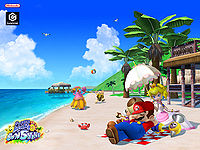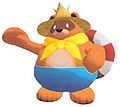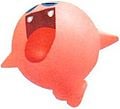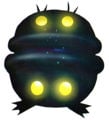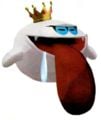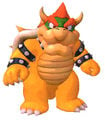Super Mario Sunshine
Super Mario Sunshine (originally known as simply Mario Sunshine) is a Mario platformer released on July 19, 2002. It is for the Nintendo GameCube and is the sequel of Super Mario 64. Despite being the first Mario game on the GameCube, it wasn't released on the same day as the console. This is the first time this happened, the next being with the Wii. Like Super Mario 64, Luigi does not appear in this game.
Story
The events start off in Peach's Plane where Mario, Peach, a few Toads, and Toadsworth are flying out to Isle Delfino for a vacation. A small T.V. on Peach's Plane is showing an ad for Isle Delfino. Mario is only interested in the food and is dazed. Toadsworth is only interested in the rest he will get when they land. Peach, however, sees a Mario-shaped shadow jumping around on the screen. She doesn't know what it could be. They make a dangerous landing in Delfino Airstrip, as they discover a large amount of Goop in the shape of Mario's head is blocking the runway. Peach sees Shadow Mario on top of a building but before she could show Mario and Toadsworth, Shadow Mario was gone. Toadsworth tells Mario too go and and find some assistance because of his concern about the well being of Peach and the dreadful heat. Mario agrees and goes on a search for something to assist him.
Mario soon finds a unique water pump invented by Professor E. Gadd named F.L.U.D.D just laying on the ground that will help him throughout his new adventure. F.L.U.D.D. scans Mario and screenshots of Mario battling Iggy Koopa in Super Mario World, and Bowser in Super Mario Bros. and Super Mario 64 are shown.
Mario takes F.L.U.D.D. over to a huge blob of Goop and when spraying the large blob in the middle of the caricature, a Goop-covered Piranha Plant exposes itself. Mario easily defeats it by squirting its head with water when its mouth was open. As the giant enemy fades into nothing, the runway returns to a normal shape, and the first Shine Sprite appears, which Mario collects, unaware of what it is. After he collects it, the Delfino Police arrive and arrest Mario. The Pianta Judge and Pianta Attorney tell Mario that Goop was polluting Isle Delfino and the most of the Shine Sprites have left the Shine Gate. Posters of the one who did it (Shadow Mario) made it look like Mario did it. After a brief, unfair court session, Mario was found guilty (Peach and Toadsworth tried to object but the Pianta Judge ignored them) and is sent to jail by the choice of the two Piantas, having being mistaken for the strange vandal on the poster who resembles him in shape and uses the Magic Paintbrush to vandalize the island, also a creation of Professor E. Gadd. Mario agrees to clean all the Goop to recover all the Shine Sprites back to the Shine Gate, Isle Delfino's main source of energy. Later after traveling to Delfino Plaza as defeating another Piranha Plant in the Generator in the middle of the town square the Grand Pianta Statue came out of the ground with Shadow Mario on top. Shadow Mario jumped down and kidnapped Peach. Mario chased Shadow Mario down and sprayed him until he dropped Princess Peach.
Template:Spoiler Once Mario's Shine Sprite total reaches 10, Shadow Mario kidnaps Peach and takes her to Pinna Park after jumped into his Koopa Boat, where Mario found Shadow Mario and chased him to the pool where Mecha Bowser appeared. After Mecha Bowser is beat by Mario by riding on the roller coaster and shooting the robotic Bowser in the head four times with missiles, Shadow Mario came out of Mecha Bowser's head and he reveals himself to be Bowser Jr., one of Bowser's children. He claims that Peach is his mother and that Mario separated her from him because to was told by his father. Bowser Jr. takes Peach to Corona Mountain (by flying in Mecha Bowser's balloon form) where his father, Bowser, awaits them.
Much later, the gate behind the Shine Gate opened and Delfino Plaza flooded over. Mario went through the gate and the final battle took place in Corona Mountain. Bowser Jr. asks Peach to come into the green Goop he and Bowser were swimming in but says Peach thinks she should not. Mario arrived and Bowser was much bigger than he normally is. Mario defeats Bowser and Bowser Jr. by doing Ground Pounds after using the Rocket Nozzle on the rocks around Bowser, Bowser Jr. and Princess Peach. Mario, Peach, Bowser, Bowser Jr., and the Shine Sprite fall down from Corona Mountain. Later, Bowser tells his son that Peach is not his real mother, but Bowser Jr. says that he knew all along that Peach was not really his mother, but Jr. wants to fight Mario again. Bowser, who sees much of him in his son, smiles. Together, they plan to hatch a new evil plot, but for now, they rest a while (because they are stranded in the middle of the ocean on the Koopa Boat. It was speculated that the revenge takes place in Super Mario Galaxy.
Mario and Peach fall down from the sky. Peach floats down with her parasol but Mario gets stuck headfirst in the sand but gets out. However, F.L.U.D.D breaks down from being used so much and from the fall. However the Shine Sprites returned to the Shine Gate and all the Piantas and Nokis were happy. Soon F.L.U.D.D was repaired by the Toads. Reunited with Mario and Peach, F.L.U.D.D. happily exclaims "The vacation starts now!". Mario finally enjoys his vacation. Pictures of their vacation are on the credits including Mario, Peach, F.L.U.D.D., Toadsworth, and the Toads.
The game ends with a scene of Il Piantissimo discovering the Magic Paintbrush in the sands of Gelato Beach. This could imply that Il Piantissimo is now the new Shadow Mario, which is further enforced because both Bowser Jr. and Shadow Mario are playable in Mario Golf: Toadstool Tour. Collecting all 120 of the Shine Sprites replaces the scene of Il Piantissimo with a group picture of all of the characters in the game posing in Casino Delfino (enemies excluded). Template:Endspoiler
Gameplay
Super Mario Sunshine is the first game where Mario extensively uses an accessory to complete his mission. F.L.U.D.D. features spray and hovering capabilities when it is first acquired; other nozzles can be unlocked to extend F.L.U.D.D's functionality, such as the "Rocket Nozzle" which propels Mario high into the air, and the "Turbo Nozzle" that lets Mario sprint on land and water, as well as break down wooden doors.
The game contains a number of independent levels, which can be reached from Delfino Plaza. Gameplay is based around collecting Shine Sprites by completing various tasks in the levels and over world, very similar to Super Mario 64, but with Shine Sprites instead of Power Stars.
There are 120 Shine Sprites in the game, and 240 Blue Coins. There are two Shine Sprites at the airstrip, sixteen in the plaza, and ten in each of the seven other areas. Including the plaza there are eight Sprites for collecting 100 Coins. There are thirty Blue Coins in each of the seven areas, making 210, in the plaza there are nineteen, one in the Airstrip, and ten in Corona Mountain, making 240 altogether. Ten Blue Coins each can be traded for one Shine Sprite at the Blue Coin Shop, making another twenty-four Shine Sprites through the Blue Coins.
At first, each level features one task which may be completed to acquire a Shine Sprite. The player is then returned to Delfino Plaza and a new task is unlocked on the level they just played. Each level consists of up to ten of these tasks, which may be played again at will once they are completed. Once the player has collected enough Shines in total, a new level is available at Delfino Plaza, either by the acquisition of a new ability or some plot-related event, such as Shadow Mario appearing in the Plaza.
Gameplay proceeds in this fashion until all of the Shadow Mario's related missions are completed (the 7th mission of each level), which unlocks Corona Mountain, containing the final boss. As the total number of Shine Sprites available at any given point is greater than the number of Shine Sprites needed to unlock the next level, the player may choose which tasks they want to attempt.
Mario can also ride Yoshis in this game. Yoshis can be used to eat certain insects and birds to produce Gold, Blue, or Red coins, and even Shine Sprites in a few cases. Yoshis can also eat fruit and squirt the juice of the color of that fruit, just like F.L.U.D.D sprays water. This juice can be used to dissolve certain kinds of pulsating goop acting as obstacles, as well as to briefly transform enemies into platforms for Mario to step on. The color of the Yoshi, as well as the effect of its juice, depends on the type of fruit last eaten.
Koji Kondo and Shinobu Tanaka produced the music for this game.
Bosses
The main bosses of the game that are powerful and rule a dominion of enemies are:
- Gooper Blooper, who controls the Bloopers of Ricco Harbor and appears in two of the harbor's episodes and one of Noki Bay's.
- Petey Piranha, who controls the Piranha Plants of Bianco Hills and appears in two of its episodes.
- Eely Mouth, who has taken up residence under Noki Bay and is poisoning the water with purple sludge.
- Wiggler, who resides on Gelato Beach as the boss of the third mission, angry at Mario for disturbing his nap.
- Mecha Bowser, a giant mechanical version of Bowser, controlled by Bowser Jr. Appear only in the first episode of Pinna Park. (Mario must fight this boss while riding a roller coaster).
- Phantamanta, the silhouette of a giant manta ray that splits into smaller manta rays when sprayed by F.L.U.D.D.
- Shadow Mario/Bowser Jr., who, although causing the whole island's issues, never actually is the boss of a level, besides every level's one Shadow Mario chasing mission.
- Bowser, the final boss of the game, is found sitting in a hot tub full of green sludge, along with Bowser Jr. and Peach far above Corona Mountain.
Minibosses
The game also has several stronger versions of normal enemies that are generally considered to be minibosses.
- Piranha Plant in the Generator, huge Piranha Plants made out of sludge, that Mario can defeat by simply squirting water into their open mouths appear in Delfino Airstrip,Delfino Plaza three times and one time in Bianco hills.
- Plungelo, a Cataquack-like species found in Gelato Beach that fight Mario on top of one of several huge mirrors.
- Monty Mole, who shows up in two levels, both times arming a large, triple-gun cannon that fires Bullet Bills, Missile Bills, and Bob-ombs.
Locations
- Delfino Airstrip is the small local airport where Princess Peach and Mario land in their airplane to start their vacation on Isle Delfino. The story also begins here, as this is where players are introduced to the concept of cleaning up the game's areas, as well as the introduction to the plot.
- Delfino Plaza is the main city on Isle Delfino, and appears to function as the capital city of the island, as this is where Mario is put on trial for his crimes. The city is of debatable national origin, as everyone there speaks English but all of the accessible area names mean something in Italian, though some might take these names to not mean anything. This town is where Mario can access all other areas of the game and it is where the story is advanced also. Princess Peach is kidnapped from Delfino Plaza, and all of her Toad assistants remain here as well. Later in the story, the city is horribly flooded as a result of malfeasance on the part of Bowser. It is shown again in Mario Kart: Double Dash!! as where the trophies are handed out and where the parades take place. The course Delfino Square from Mario Kart DS appears to be based on Delfino Plaza. Delfino Plaza also appears as a stage in the game Super Smash Bros. Brawl, although there are a few minor differences in the area.
- Bianco Hills is a small village northwest of Delfino Plaza and seems to function as a suburb. The small village is famed for its windmills, and contains a lake and a large central windmill. The town is besieged by various evils during Mario's adventures there, including two devastating attacks by Piranha Plants and Petey Piranha.
- Ricco Harbor is an industrial area just off to the west of Delfino Plaza, and is a major shipping port. At any given time, several ships are in the harbor, shipping off various goods to the other parts of the island and, as would seem to be logical, to other parts of the world. A farmer's market is also found here. The harbor is attacked by a giant squid named Gooper Blooper on several occasions. The water in the harbor is frequently polluted with black Goop. It also appears in Mario Power Tennis with the name Blooper Bay.
- Gelato Beach is a peaceful, eternally sunny beach in the middle of a large bay. Gelato Beach and Pinna Park, are the only courses in the game which do not require the cleaning up of goo. In the middle of the beach, there is an enormous tower devoted to capturing sunlight and using it to warm the egg of a giant Sand Bird.
- Pinna Park is actually on a separate island, but is very close to Isle Delfino and is separated from it by a small strait. There are actually two parts to Pinna Island: its small beach and the amusement park which takes up the rest of the island. Its beach has large, talking sunflowers. The park must close when it is attacked by a cannon-wielding Monty Mole, and it is completely disrupted when a gigantic mechanized Bowser robot attacks, and Snooze-A-Koopas weakening the sunflowers. Due to the population of Electrokoopas and Electrowallkoopas on the rest of the island, the park is suffering from a lack of visitors. Eventually, a large Electrokoopa causes the Ferris Wheel to spin out of control.
- Sirena Beach is another beach located on the far side of the bay from Delfino Plaza. A world-class hotel and a spectacular view are here. According to the game, it is a favorite retreat for couples. The hotel is somewhat disrupted when attacked by a large, manta ray-like ghost that leaves a trail of blue and yellow electric Goop, and the hotel is haunted by King Boo and his ghosts.
- Noki Bay is on the far side of the island and is home to the Nokis, one of two races that live on Isle Delfino. The first time Mario visits, the water is found to be horribly polluted and is dangerous to touch. Despite battling Monty Mole and Gooper Blooper again, the source of the pollution is found to be a gigantic underwater eel named Eely Mouth with gingivitis. According to the game, the gigantic waterfall is the main tourist attraction in the bay. The entrance to to this level is an homage to the Super Mario 64 course Winged Mario Over the Rainbow.
- Pianta Village is the ancestral home of the Piantas, the other, more common of the two races who live on Isle Delfino. The most prominent feature of the world is that the entire village is built on a massive tree that extends its branches over a canyon that seems to be endlessly deep. This is to keep the Piantas safe from predators. There is also a village underside containing huge mushrooms, but some Wind Duppies are present there. The village is frequented by orange, fiery Goop.
- Corona Mountain is a large volcano in the middle of the island and it is where the final battle takes place.
Secret Levels
Every area in the game has one or two secret levels. These are never part of the regular area and are usually inside an alcove (barred off after defeating the level). These secret levels start with a short cutscene of Mario falling through a white area and Shadow Mario stealing F.L.U.D.D, thus leaving Mario only to rely on his acrobatic skills. These levels can also be revisited, but F.L.U.D.D will be accessible to aid in movement. There is also a red or pink switch that, when pressed, makes eight Red Coins appear throughout the level and sets off a timer. The red coins must be collected before the timer runs out or Mario loses a life and has to restart the level.
These levels feature a remix of the classic "Mario Bros." music (Super Mario Bros. for the NES) in a rhythmic, upbeat, a cappella style accompanied by snapping fingers. Secret levels are staged in an apparently infinite void in which Mario may fall and lose a life. There any many types of multi-colored platforms and obstacles in these secret levels, such as:
- Red and blue platforms that flip constantly. The player must Jump on these from red platforms to blue platforms because they flip in a set sequence.
- Long, square-faced wooden blocks with colored knobs that rotate, so the player must run along the long dimension or risk being flipped off.
- Cubes made of glass with white edges that have colored corners that frequently sit at the edge of a platform (or shortly off it). These will carry Mario on the top and move to otherwise-unreachable platforms as they rotate and turn.
- Blocks made of sand that crumble as Mario steps on them (but regenerate shortly). These are often arranged into a long path that crumbles if not crossed swiftly or a sand castle that has to be navigated through that is continually breaking apart.
- Blocks that disappear at regular intervals, regardless if the player steps on one of them. They are very tricky and are tough to move across without falling.
- Moving Yoshi Egg patterned blocks that move in a set path and must be jumped across in order.
- Orange blocks with no special characteristic other than moving in every direction. They are arranged in large groups.
- Some platforms have nails sticking out of them. If Mario Ground Pounds on them three times they will be completely in the ground and the player could get a few coins, a 1-Up Mushroom, but usually nothing. They are usually on large platforms that are not moving.
It is also noteworthy that, when losing a life on the secret levels, Mario will restart at the starting point of the level as opposed to returning to Delfino Plaza like he does after dying anywhere else. The exception to this rule is when Mario loses all lives, when he would invariably be returned to the plaza).
There is also a second, rare type of secret levels. In these secret levels, Mario always has access to FLUDD. They also have a different background music. One appears in Episode 4 of Gelato Beach, one in Episode 3 of Noki Bay. Secret levels are also available in Delfino Plaza such as :
- A level with Blocks.Mario has to use FLUDD's nozzles get the Shine.
- A Slide level with blocks somewhat similar to The Princess's Secret Slide in Super Mario 64.
- A level with tall grass. Mario has to search Red Coins and defeat enemies in the grass.
- A level shaped like a giant Pinball Machine. Mario has to collect Red Coins here.
- A level with Red Coins and a stump in the Poisonous River. Mario has to do what he did in Corona Mountain.
Items
- Shine Sprites - When certain totals are achieved, the story progresses.
- F.L.U.D.D - Helps Mario throughout the game with various abilities.
- Nozzles- Allows Mario to Hover for a short time, blast up in the air, or make him go extremely fast.
- Red Coins - Some levels require all eight Red Coins of the level to be found in order to get the Shine Sprite.
- Blue Coins - Can be traded for Shine Sprites at the Blue Coin Shop.
- 1-Up Mushrooms - Give Mario an extra life.
- Fruit - Food for Yoshis, which refills their Juice Meter.
- Water Bottles - Fill F.L.U.D.D's water tank.
- Mario's Hat - Stops Mario from losing lives.
- Gold Coins - Mario can collect 50 to get a life, or 100 to get a Shine Sprite.
- Water Barrel - Mario can throw it to clean a large area, as it releases a large burst of water.
- Trampoline - Allow Mario to reach higher areas.
- Water Rockets - Missiles that attach to F.L.U.D.D that can be launched with water
Glitches
- Main article: List of Glitches#Super Mario Sunshine
Game Artworks
It should be noted that most of the artwork done for Super Mario Sunshine is a bit more unique in the way it portrays a lot of objects, particularly the appearance of enemies, creatures and items. When the game artists created the said materials for the game, they used some slight and some drastic differences (specifically to the appearance of enemies) in contrast to their appearance in the other adventure installments for the Mario series.
Featuring Mario Himself
- Plumbersunshine.jpg
- Mario120302 big.jpg
Mario cleaning - Sms mario jump.jpg
Mario jumping - Sms shine get.jpg
Mario reaching for a Shine - Sms mario hover.jpg
Mario with the Hover Nozzle - Smsmariojump.jpg
Mario - Smsmariorun.jpg
Mario - Smsmario-dirty.jpeg
Mario covered with graffiti - Art13.jpg
Mario cleaning while covered with graffiti - Smsmariospray.jpg
Mario using F.L.U.D.D. - Smsmariojump2.jpg
Mario jumping - Smsmariorun2.jpg
Mario running - Sms marioyoshi.jpeg
Mario riding Yoshi - Smsmariosneak.jpg
Mario tip toeing - Sms dive.jpg
Mario sliding - Ground Pound.jpg
Mario doing a Ground Pound - Smsmarioswim.jpg
Mario swimming - Smsmariohover.jpg
Mario with the Hover Nozzle - SMSunshine TurboNozzle.jpg
Mario with the Turbo Nozzle - Smsmariorocket.jpg
Mario with the Rocket Nozzle - Smsspinjump.jpg
Mario doing a Spin Jump - Smsmarioflip.jpg
Mario doing a flip - Wall Jump.jpg
Mario doing a Wall Jump - SMSPineapple.jpg
Mario riding Yoshi
Supporting Characters
Enemies
- Blooperghoul.jpeg
- Cataquack.jpg
- Electrokoopa.jpg
A blue Electro-Koopa - Electro-Koopa.png
A red Electro-Koopa - Booshine.jpeg
A Boo A Pink Boo - Itsyyellowspider.JPG
A Klamber - Snooze-A-Koopa.jpg
- BombSunshine.jpg
A Bob-omb
Bosses
- Goopy.jpg
- MMSS.jpg
- Gooperblooper01.jpg
- Petey Piranha.png
- Sms wiggler.jpg
- Chaimplet.jpeg
- Mechabowser.jpg
- SMarioSMS.jpg
- M-ariosunshine719 gcn art4-jpg.jpg
Shadow Mario kidnapping Peach - Sms bowser jr.jpg
Items
Miscellaneous
- M Mario Sunshine.JPG
Shadow Mario's graffiti
Group Pictures
- Group.jpg
The cast at Delfino Plaza, taking cover from Shadow Mario's assault Mario, Toadsworth, and Peach relaxing at Gelato Beach Peach, Mario, and one of the Toads
Packaging
Quotes
For a full list of quotes, see here.
References to Other Games
- Super Mario Bros.: Before the game starts, an 8-bit coin sound effect is played while the copyright information is displayed. Also, remixes of the main Super Mario Bros. theme, as well as the underground stage theme, are featured in the game. There's also a stage where an 8-bit Mario can be seen in the background. Also, at the beginning of the game, you can see three "memories" of Mario in the lower left-hand corner. The first of the three is a NES video of Mario approaching Bowser on the iconic bridge (although it could be a False Bowser, and it could also just as easily have been a FDS recording of Super Mario Bros.: The Lost Levels).
- Super Mario World: When FLUDD scans Mario, the second video shows the SNES boss fight with Iggy Koopa. Also, the ability to climb on gates and punch enemies from the inside of it originated from this game
- Luigi's Mansion: During the third episode of Sirena Beach, one of the employees in the hotel claims that the ghosts are annoying and wishes that "Someone would come and suck them away with a vacuum or something" and then asks Mario "Why are you looking at me like that?".
- Super Mario 64: Also when FLUDD scans Mario, the last video is the memorable N64 boss fight with Mario swinging Bowser by the tail. The stage is Bowser in the Dark World.
References in Later Games
- Paper Mario: The Thousand-Year Door: Shine Sprites made an appearance in this game, but they had an entirely different purpose. Also, Doopliss's parrot will say the phrase, "Shine Get!", which came from the Japanese version of Super Mario Sunshine.
- Super Mario 64 DS: A new beach stage called the Sunshine Isles plays a version of Isle Delfino music in the background.
- Mario Kart: Double Dash!!: Shine Sprites were included in this game. There is also a stage that contains Cataquacks.
- Mario & Luigi: Partners in Time: The Shine Sprites make an appearance in this game. The Baby Bros. have to hit them to get some light for a limited time in dark areas.
- Super Paper Mario: There's a Sammer Guy who calls himself "Sunshine FLUDD".
- Super Smash Bros. Brawl: Mario could use FLUDD in this game to spray his opponents. Also, Isle Delfino appears as a selectable stage.
Trivia
- A Test Level is accessible, only by use of an Action Replay cheating device. This was a debugging level that the developers forgot to take out of the game. It is scattered with blocks with numbers, and there is also a giant blob-like creature with legs.
- Unlike Super Mario 64 where the player could usually get most Power Stars no matter which mission was chosen, this game usually lets Mario obtain only the Shine Sprite the player select from the screen prior to the level. It is possible, however, to bypass the main objective of Bianco Hills episode one by defeating Petey Piranha, the main objective of episode two.
- This fact is referenced in-game. If Mario talks to a Pianta resting on the path to the windmill during Episode 1 of Bianco Hills, he will question Mario and tell him that he's supposed to do something else first.
- Super Mario Sunshine is the first Mario game to have extensive character voice acting, and currently the only one.
- This is the first Mario game to feature Bowser Jr. and Toadsworth.
- This is the only game to date in which Mario wears a short sleeved shirt.
- The 120 total Shine Sprites in this game is the same number of total Power Stars in Super Mario 64.
- Every level has it's own unique theme to it. Bianco Hills is a villagy type theme, Gelato Beach is reggae.
